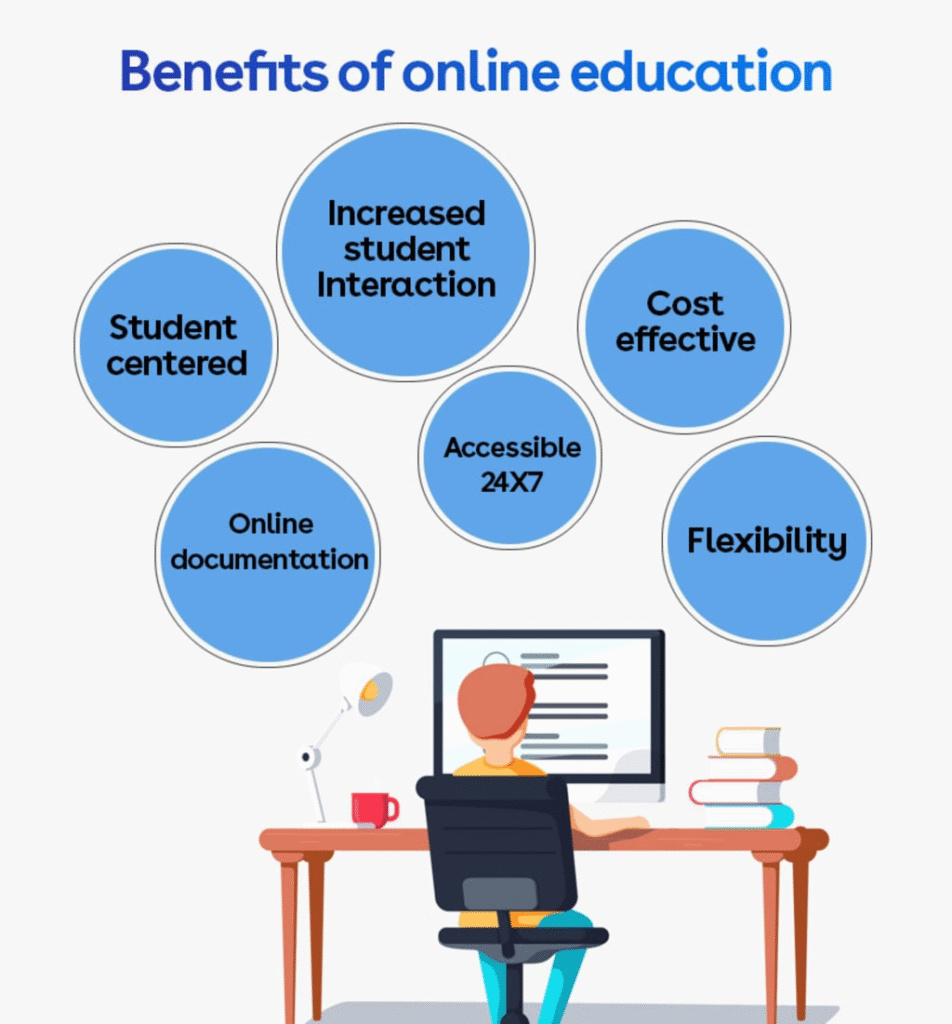With the rapid evolution of technology and the growing need for flexible learning options, university courses Online University have become an integral part of higher education. More students than ever are enrolling in Online University degree programs and courses, driven by convenience, accessibility, and often cost savings. However, succeeding in university courses online is not just about logging into a platform and watching lectures. It requires dedication, strategy, and a proactive mindset to thrive in a virtual learning environment.
This Online University article explores how you can excel in university courses Online University, highlighting the skills, habits, and approaches needed to maximize your success. Whether you’re new to online education or looking to improve your current performance, these insights will help you navigate and excel in the world of online university courses.
Key Takeaways
- Online University courses online provide flexibility but require strong self-discipline and time management.
- Establishing a dedicated study space and routine can significantly improve focus and productivity.
- Active engagement with course materials, instructors, and peers is crucial for deeper learning and motivation.
- Use varied study techniques and multimedia resources to enhance understanding.
- Address isolation and technical challenges proactively to maintain smooth progress.
- Consistent motivation and goal setting are key to completing university courses online successfully.
By applying these principles, you will position yourself for success in your university courses online and beyond.
Understanding the Landscape of University Courses Online
Online University Over the past two decades, the landscape of higher education has undergone a monumental transformation, largely driven by the rise of digital technology and the increasing need for flexible, accessible learning options. University courses online have emerged as a powerful alternative—or complement—to traditional, campus-based learning. Today, they are not just an emergency solution or a backup plan but a preferred educational model for millions of students around the globe.
The Evolution of Online Education
The concept of distance learning has existed for over a century, dating back to correspondence courses offered through the mail. However, the real shift began in the early 2000s, when broadband internet and e-learning platforms made it possible for universities to deliver full courses online. Since then, university courses Online University have evolved from basic, text-heavy formats to sophisticated, interactive experiences featuring live lectures, forums, group projects, and digital labs.
During the COVID-19 pandemic, the adoption of Online University courses accelerated dramatically. What started as a necessity became a revelation: students and faculty alike discovered that learning could be both remote and effective. Now, as institutions continue to invest in digital infrastructure, online education is not just here to stay—it is redefining the university experience.
Who Takes University Courses Online?
Online University courses online cater to a diverse and growing population of learners. These include:
- Working professionals seeking to upgrade their skills or shift careers.
- Parents and caregivers who need the flexibility to balance education with family responsibilities.
- International students who want access to global education without relocating.
- Traditional college-age students who prefer or require remote learning options.
- Lifelong learners who are driven by curiosity and self-improvement.
This diversity has led institutions to design Online Universityprograms that are more inclusive, accessible, and customizable than ever before.
The Types of University Courses Online

Online university courses come in various forms, catering to different needs and learning preferences:
- Fully Online Degree Programs: Complete undergraduate or graduate programs offered entirely online.
- Hybrid or Blended Courses: A mix of Online University and in-person instruction, offering flexibility with some campus engagement.
- Self-Paced Courses: Courses that allow students to progress at their own speed, ideal for independent learners.
- Synchronous Courses: These involve real-time virtual classes, maintaining a structure similar to traditional classrooms.
- Asynchronous Courses: Lessons are pre-recorded and materials are available anytime, offering maximum flexibility.
The Online University structure and delivery of university courses online are often designed with the student’s schedule and lifestyle in mind, making them more adaptable than ever.
Platforms and Tools Powering Online Learning
The success of Online University courses online is heavily influenced by the platforms and tools that support them. Universities rely on Learning Management Systems (LMS) such as:
- Canvas
- Moodle
- Blackboard
- Google Classroom
These platforms host course materials, assignments, assessments, discussion boards, and communication tools. In addition, video conferencing platforms like Zoom, Microsoft Teams, and Google Meet facilitate live interaction between instructors and students.
Supplementary tools such as Khan Academy, LinkedIn Learning, Coursera, edX, and Udemy often complement traditional academic offerings, sometimes even providing content directly integrated into university curricula.
Accreditation and Credibility
One of the common concerns among prospective students is whether university courses online are as credible as their on-campus counterparts. In most cases, they are. Accredited universities often maintain the same standards for their Online University programs as they do for in-person instruction. The curriculum, faculty, assessments, and even the diplomas awarded are typically identical.
It’s important to verify that the institution offering the online course is accredited by a recognized accrediting agency. Accreditation ensures that the education you receive meets established standards and that your degree will be recognized by employers and other academic institutions.
Benefits of University Courses Online

There are several compelling benefits to pursuing university courses Online University:
- Flexibility: Learn anytime, anywhere—perfect for those with busy schedules.
- Accessibility: Students from remote areas or with mobility challenges can access high-quality education.
- Affordability: Often lower tuition fees and reduced costs for transportation, housing, and materials.
- Customization: Learn at your own pace, revisit materials, and choose from a wide range of electives or certifications.
- Career Integration: Many learners are able to work while studying, allowing immediate application of knowledge and minimal disruption to income.
These advantages make university courses online not only viable but often preferable for many learners.
Challenges to Be Aware Of
Despite their many benefits, university courses online come with challenges:
- Lack of face-to-face interaction: Online University provide Some students may miss the social element of traditional campuses.
- Time management demands: Students must be self-motivated and disciplined.
- Technical requirements: Access to a reliable internet connection and a suitable device is essential.
- Perceived stigma: Though fading rapidly, some employers or institutions may still undervalue Online University degrees.
By understanding these challenges upfront, students can take steps to mitigate them and make the most of their Online Universitylearning experience.
The Future of Online University Education
Online University gives technology continues to evolve, so will university courses online. Innovations such as artificial intelligence, virtual and augmented reality, and adaptive learning platforms are already being integrated into online classrooms. These technologies promise to make online education more engaging, personalized, and effective.
Online University Moreover, the global shift toward remote work has underscored the value of digital skills and virtual collaboration—skills that students naturally develop through online learning. In this sense, university courses online not only prepare students academically but also professionally.
Building a Strong Foundation for Success in Online University Courses
Create a Dedicated Learning Environment
Online University One of the most important factors for succeeding in university courses online is having a dedicated and distraction-free study space. Unlike traditional classrooms where the environment is controlled, online learners must create their own conducive study zones. This means finding a quiet, comfortable, and well-lit area where you can focus without interruptions.
Having a consistent learning space not only improves concentration but also signals to your brain that it’s time to study, enhancing productivity.
Manage Your Time Effectively
Online University give Time management is critical in online learning. University courses online often allow students to set their own pace, which can lead to procrastination if not managed well. Using calendars, planners, or digital tools like Google Calendar or Trello can help keep track of assignment deadlines, exam dates, and study sessions.
Breaking down large assignments into smaller, manageable tasks and scheduling regular study blocks can ensure steady progress. Remember, consistency beats cramming when it comes to online courses.
Stay Organized
Organizational skills are vital when juggling multiple university courses online. Keeping digital or physical folders for lecture notes, assignments, readings, and communications can save time and reduce stress. Use file-naming conventions and categorize materials by week or topic to easily locate resources when needed.
Engage Actively with Course Materials and Instructors
Participate in Online Discussions
Many Online University courses online feature discussion boards, group chats, or video forums where students and instructors interact. Actively participating in these discussions can deepen your understanding, clarify doubts, and foster a sense of community.
Engagement also shows your instructors that you’re invested in the course, which can positively impact your experience and sometimes even your grades.
Reach Out to Professors and Peers
Don’t hesitate to contact your instructors for help or clarification. University courses online often provide email, chat, or video conferencing options for communication. Building relationships with your professors and classmates can provide support and networking opportunities that enhance your learning experience.
Develop Effective Study Techniques for Online Learning
Use Active Learning Strategies
Active learning techniques like summarizing notes, self-quizzing, and teaching concepts to others can improve retention and understanding. Passive watching of lectures is rarely enough to excel in university courses online.
Take Advantage of Multimedia Resources
Online University courses frequently offer videos, podcasts, readings, and interactive exercises. Utilizing these various formats can cater to different learning styles and reinforce key concepts.
Overcome Challenges Unique to University Courses Online
Combat Isolation
One of the biggest challenges students face in university courses online is the feeling of isolation. Unlike a physical classroom, the virtual space can feel lonely. To overcome this, join study groups, participate in social media groups related to your course, or schedule regular video chats with classmates.
Handle Technical Issues Proactively
Technical problems can disrupt your learning process. Familiarize yourself with the platform used for your university courses online and ensure you have reliable internet access and necessary software. Keep contact info for technical support handy.
Stay Motivated Throughout Your Online University Journey
Maintaining motivation is one of the most critical—and often most challenging—parts of succeeding in university courses online. Unlike traditional classroom settings, where physical presence, scheduled sessions, and direct interactions with peers and instructors provide structure and accountability, online learning places much of the responsibility squarely on the shoulders of the student. With the flexibility of university courses online comes the need for stronger self-discipline, focus, and emotional resilience.
Even the most committed students can experience dips in motivation. Life interruptions, academic fatigue, lack of immediate feedback, and isolation can all contribute to moments where staying on track feels difficult. The good news is that with the right strategies, it’s absolutely possible to reignite your motivation and maintain consistent momentum throughout your online education journey.
Understand Your “Why”
One of the most effective ways to stay motivated during university courses online is to clearly define your purpose. Ask yourself:
- Why did I enroll in this course or program?
- What do I hope to achieve by completing it?
- How will this impact my future—personally, professionally, or both?
Write your answers down and keep them visible in your study area. Whether your goal is to earn a degree, switch careers, get a promotion, or simply learn something new, connecting your daily efforts to a larger purpose can provide the inner drive you need to push through challenging times.
Set Achievable, Measurable Goals
Long-term goals can feel abstract and overwhelming, especially when the end of the course or program is months or even years away. Break your university courses online into smaller, manageable milestones. These can include:
- Completing weekly readings and lectures
- Submitting assignments on time
- Achieving specific grades on quizzes or exams
- Participating in discussion boards consistently
Each time you accomplish one of these short-term goals, reward yourself in a small way. The sense of progress is inherently motivating, and it creates a positive feedback loop that reinforces your efforts.
Create a Routine and Stick to It
While the flexible nature of university courses online is one of their biggest benefits, it can also lead to inconsistent study habits. Creating a regular routine helps counteract this. Set specific times during the week that are dedicated to learning, just as if you were attending on-campus classes.
Make these sessions part of your weekly calendar and treat them as non-negotiable appointments. Consistency helps build momentum, and over time, studying becomes a natural part of your lifestyle rather than a sporadic effort.
Use Time-Blocking and Productivity Techniques
Techniques such as time-blocking and the Pomodoro Technique can help you stay focused and make your study sessions more effective. Time-blocking involves allocating specific chunks of time for different tasks, such as reading, taking notes, watching lectures, or completing assignments.
The Pomodoro Technique, where you work for 25 minutes and then take a 5-minute break, helps prevent burnout and keeps your mind fresh. These methods not only improve your productivity but also give your day structure—a crucial element for staying motivated in university courses online.
Surround Yourself With Support
Even though university courses online are remote, you don’t have to go through them alone. Building a support network is essential for maintaining motivation. This can include:
- Family members who encourage your progress
- Friends who keep you accountable
- Fellow students you connect with through online discussion forums or group chats
- Mentors or faculty members who offer guidance
Regular communication with others who understand your goals can be uplifting and can help you stay engaged with your studies. If possible, join or form virtual study groups. The sense of shared purpose and collaboration can recreate some of the social energy found in traditional classrooms.
Use Course Forums and Social Media to Stay Connected
One underrated motivational tool in university courses online is social interaction through forums, message boards, and dedicated social media groups. These platforms provide a space to:
- Share your experiences and frustrations
- Ask questions and get answers
- Learn from others’ perspectives
- Celebrate your achievements and those of others
Participation not only keeps you socially connected but also reminds you that you are part of a larger learning community. Seeing others make progress can be a powerful motivator to stay on your own path.
Track Your Progress Visually
Seeing how far you’ve come can renew your motivation to keep going. Use a wall calendar, digital tracker, or app to log your accomplishments. This might include:
- Completed modules or units
- Assignments submitted
- Quiz and exam scores
- Hours spent studying
Visual progress charts help make your effort tangible, and reviewing them regularly can reinforce your commitment to completing your university courses online.
Mix Things Up to Beat Monotony
Monotony is a motivation killer, especially when your learning environment doesn’t change. To stay mentally engaged:
- Switch up your study location occasionally
- Use different learning formats (videos, podcasts, flashcards, etc.)
- Explore related content outside the curriculum
- Add variety to your routine with timed challenges or group discussions
Even something as simple as rearranging your study space or listening to background music can refresh your mindset.
Celebrate Milestones—Big and Small
It’s easy to downplay your achievements when taking university courses online, especially since there may be no in-person acknowledgment or ceremonies until the end. Don’t wait until you graduate to celebrate. Recognize small wins along the way:
- Finishing a tough module
- Improving a grade
- Balancing school with work or family commitments
- Overcoming procrastination for a full week
Celebrating progress keeps you emotionally invested in the journey and reminds you of how much you’re capable of achieving.
Revisit and Revise Your Goals
Your motivation can fluctuate depending on external circumstances, changing interests, or evolving goals. Take time every month or so to revisit your objectives. Are they still aligned with your personal or professional vision? Do you need to adjust your timeline or expectations?
Being flexible and forgiving with yourself can prevent burnout. University courses online are a marathon, not a sprint—staying adaptable is key to long-term success.
Also Read:
Conclusion
Succeeding in Online University courses online requires more than just academic ability; it demands commitment, planning, and adaptability. By creating a focused learning environment, managing your time wisely, actively engaging with course materials and instructors, and developing strong study habits, you can excel in online education. Overcoming challenges such as isolation and technical issues with proactive strategies will further enhance your success. Remember, university courses online offer incredible opportunities for flexible, accessible education — with the right approach, you can make the most of them and achieve your academic and career goals.
Also Read: Which Are the Best Universities to Study Abroad In?
FAQs
What are the most important skills for succeeding in university courses online?
Time management, self-discipline, effective communication, and organization are essential skills to thrive in university courses online.
How can I stay motivated in an online course?
Setting realistic goals, creating a study schedule, and maintaining social connections with classmates can help keep motivation high.
Are university courses online as credible as traditional courses?
Many universities offer accredited online courses that are equally credible. Always verify the accreditation before enrolling.
How do I manage distractions while studying online?
Create a dedicated study space, turn off non-essential notifications, and use focus techniques like the Pomodoro method to minimize distractions.
Can I get help from instructors in university courses online?
Yes, most online courses encourage communication via emails, chat, or video calls with instructors.
What should I do if I have technical issues during an online course?
Contact technical support promptly and familiarize yourself with the course platform ahead of time to minimize disruptions.
How can I interact with classmates in university courses online?
Engage in discussion forums, group projects, and social media groups to connect with peers.



